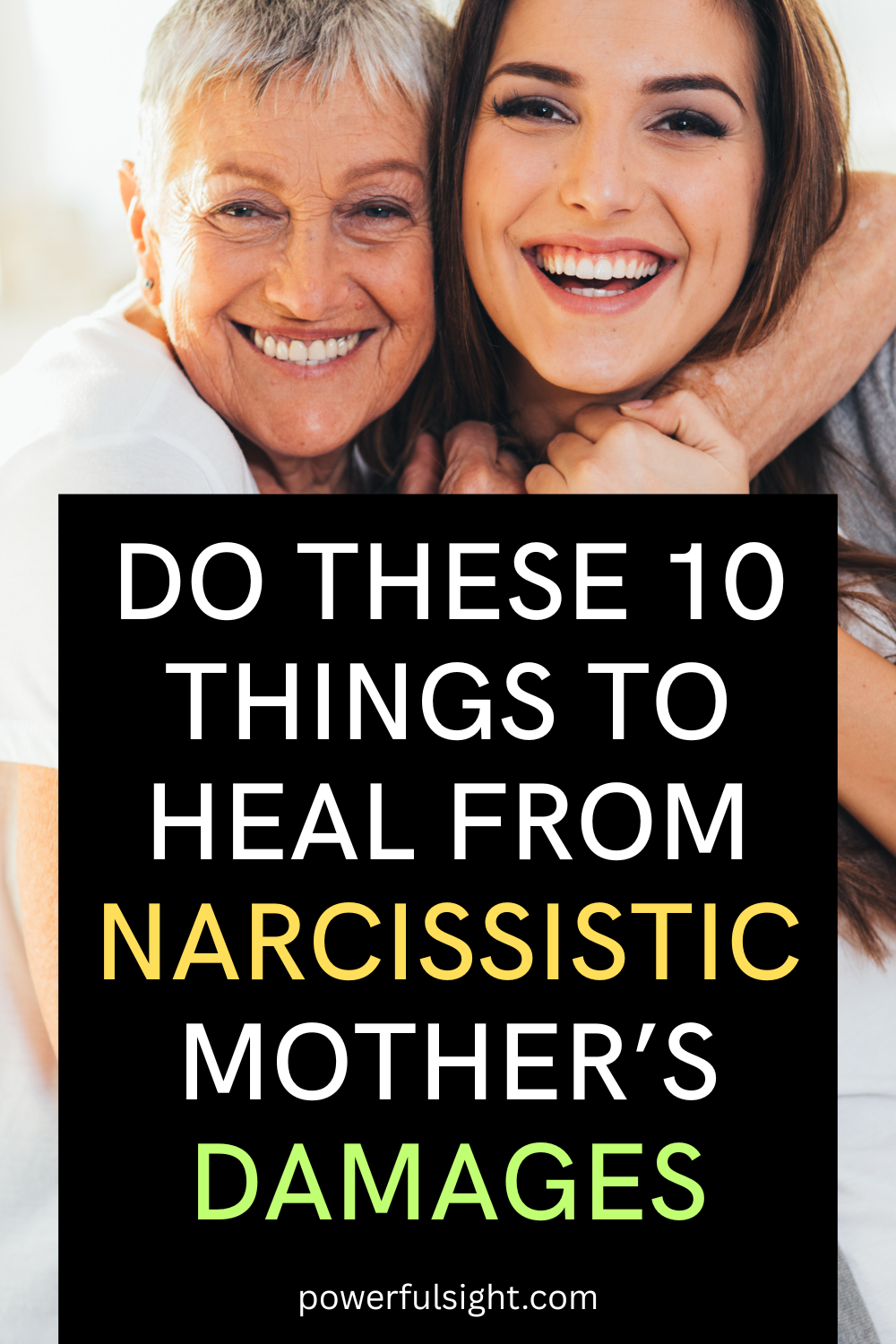Growing up with a narcissistic mother can be psychologically traumatic and difficult to heal from. Children of narcissistic parents often struggle with low self-esteem, people-pleasing, an inability to trust others, and a harsh inner critic that never shuts off. These wounds don’t simply fade away as you age—they follow you into adulthood until you decide they are no longer acceptable.
I once had a friend who grew up under the constant control and criticism of her narcissistic mother. For years, she carried the hurt of feeling small, unheard, and unworthy. But with time, therapy, self-work, and firm boundaries, she began to reclaim her sense of self. Her experience taught me that, although the wounds may run deep and long into adulthood, healing is always possible.
If you’re on that path yourself, here are realistic and compassionate steps you can take to heal from the damage of a narcissistic mother.

How to heal from Narcissistic mother damages
1. Acknowledge the Wounds
The first step is coming to terms with the truth of what happened. Many children of narcissistic mothers develop a defense mechanism that convinces them “it wasn’t that bad” or “all mothers are critical.” But denial keeps the wounds alive and stands in the way of healing.
Healing begins when you face your truth and accept that what happened was real, painful, and undeserved.
Healing tip: Write down painful childhood experiences and how they influence your current life. Seeing these patterns helps you realize it was never your fault.
Related: How to Survive a Narcissistic Mother
2. Grieve the Mother You Never Had
One of the hardest parts of healing is letting go of the fantasy that your mother will one day change or finally give you the love you needed. It’s normal to want that apology, that moment of softness, or that proof she truly cares. But part of healing is grieving the loss of the mother you needed and didn’t have.
This grief isn’t about giving up—it’s about freeing yourself from waiting for something that may never come.
Related: What To Do When Your Narcissistic Mother Dies
3. Learn to Say No Without Guilt
When dealing with a narcissistic parent, boundaries are crucial. That might mean limiting phone calls, refusing to discuss certain topics, or creating physical distance. At first, you may feel guilty or “selfish,” but boundaries aren’t about punishment—they are about preserving your mental and emotional health.
Healing tip: Start small. Even saying, “I can’t talk right now, I’ll call you later,” is a step toward reclaiming your space.
Related: 10 Things Narcissistic Mothers Say and What They Mean
4. Reparent Yourself
Just because your mother didn’t give you unconditional love doesn’t mean you can’t learn to give it to yourself. This is called reparenting. It means becoming the loving, supportive parent you always needed.
Reparenting looks like:
-
Speaking kindly to yourself when you make mistakes.
-
Celebrating your achievements, big or small.
-
Allowing yourself to rest, play, and feel joy without guilt.
In other words, you learn to give yourself the love you were deprived of.
Related: What To Do As A Daughter Of A Narcissistic Mother
5. Seek Therapy or Support
Healing from narcissistic abuse can feel overwhelming to do on your own. A therapist who understands family trauma and narcissistic dynamics can help you make sense of your experiences, rebuild your self-esteem, and manage triggers.
If therapy isn’t accessible, support groups, online communities, and books on narcissistic abuse can be helpful alternatives. Sometimes, simply realizing you’re not alone in your struggles can be incredibly healing.
6. Recognize the Inner Critic
Children of narcissistic mothers often carry their mother’s voice in their heads well into adulthood. This inner critic whispers: “You’re not good enough,” “You’ll never succeed,” or “Nobody really likes you.”
The key is to recognize this voice and challenge it. It isn’t your truth—it’s a reflection of your mother’s wounds, not yours.
Healing tip: When you catch yourself being self-critical, ask: Would I say this to someone I love? If not, replace it with something kinder.
7. Redefine Your Self-Worth
A narcissistic mother often conditions her child to believe their worth depends on pleasing others. Healing means breaking that cycle and realizing your value is not tied to achievements, appearances, or external approval.
Do things you love, nurture healthy relationships, and remind yourself daily: I am worthy just as I am.
8. Practice Emotional Detachment
If you maintain some kind of relationship with your mother, it’s important to stop expecting her to give what she cannot. That doesn’t mean you don’t love her—it means you’re protecting yourself from constant disappointment.
When she criticizes or manipulates, remind yourself: This is not about me. Creating this emotional distance makes her words lose their power over you.
Related: How to Deal with a Narcissistic Mother
9. Surround Yourself With the Right People
Healing isn’t only about distancing yourself from toxic relationships—it’s also about building new, healthier ones. Spend time with people who listen, encourage, and value you. Over time, these relationships can help rewrite your inner script about what love and respect truly look like.
10. Be Patient With Your Journey
Healing from a narcissistic mother isn’t quick or linear. Some days, you’ll feel strong and free. Other days, old wounds will resurface. That’s okay.
What matters is that you keep moving forward. Every boundary set, every inner critic silenced, and every act of self-kindness is a step toward lasting recovery.
Final Thoughts
The wounds of a narcissistic mother are real, but they don’t have to define your whole life. My friend is proof of that. Growing up, she felt unworthy and unlovable. But with time, firm boundaries, therapy, and self-compassion, she began to rebuild her sense of self.
You can, too.
Healing is about reclaiming your voice, your worth, and your life. It’s about becoming the person you always were before those wounds were inflicted.
You may not have had the mother you needed, but you can become the person you need for yourself—and that is the most powerful healing of all.
Save the pin for later

- 10 Valentine’s Day Basket Ideas - 09/02/2026
- How To Exit Your Lazy Girl Era - 08/02/2026
- 65 Truth or Dare Questions for Adults - 08/02/2026
